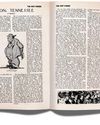Prøve GULL - Gratis
CITY OF GOD
The New Yorker
|October 28, 2024
The Met’ revelatory show on Siena.

Chop down a poplar tree. Other kinds of wood could work, too, but poplar is an especially soft one, and your task is to trim it into thin planes. These you'll need to coat in a barrier of plaster and animal gluenaked wood is highly absorbent, and you can't have it drinking down everything you put on it. Wait until the barrier has dried. Sand. Repeat until you have a perfectly smooth surface.
Sketch your preferred silhouettes with a stick of charcoal, slather the negative space in a gluey reddish mixture, cover that in translucent gold leaf (glueless, the metal has a queasy green tinge), and burnish that with a wolf's tooth. Now, and only now, you may pick up your brush.
The Met's new show about what happens next, "Siena: The Rise of Painting, 1300-1350," makes clear how astonishing it is that paint, of all things, became the center of Western art. Gold was prettier. Wood was tougher. Textile and ivory, both well represented here, travelled from city to city more freely. Nobody ever looked at an egg yolk, the signature ingredient in tempera, and thought "sublime," let alone "enduring," but here we are, seven centuries later. There may never be another big American exhibition about this freakish little era, when artists figured out how to make colorful ooze do their bidding.
Denne historien er fra October 28, 2024-utgaven av The New Yorker.
Abonner på Magzter GOLD for å få tilgang til tusenvis av kuraterte premiumhistorier og over 9000 magasiner og aviser.
Allerede abonnent? Logg på
FLERE HISTORIER FRA The New Yorker

The New Yorker
FORTRESS OF SYNERGY
\"Superman.\"
6 mins
July 21, 2025

The New Yorker
THE NEXT WAR
Is the U.S. ready for the future of combat?
39 mins
July 21, 2025

The New Yorker
ESCAPE ROUTE
Geoff Dyer tracks the comic confusions of a working-class British upbringing.
12 mins
July 21, 2025

The New Yorker
Paige Williams on Marquis James's Preview of the Scopes Monkey Trial
One of the first New Yorker writers hired by Harold Ross, the founding editor, was Marquis James. The men were good friends whose wives were also good friends; the couples vacationed together. James's début feature ran in the second issue, in February, 1925. I could have written this piece about that piece, a Profile of Alice Roosevelt Longworth, a child of Theodore Roosevelt, based on the following passage alone: “She knows men, measures and motives; has an understanding grasp of their changes. That's all there is to what is grandiosely known as ‘public affairs.”
2 mins
July 21, 2025

The New Yorker
BAGGAGE CHECK
“Too Much,” on Netflix.
5 mins
July 21, 2025

The New Yorker
LOSING LONELINESS
In the age of A.I., you never have to feel lonely again. That's not necessarily a good thing.
15 mins
July 21, 2025

The New Yorker
JUNK-DRAWER HEART
Ryan Davis's wordy disquisitions on desire.
5 mins
July 21, 2025

The New Yorker
FAMILY PRACTICE
A pediatrician’s search for redemption.
24 mins
July 21, 2025

The New Yorker
NATURAL HISTORY
He walked out of the precinct and wondered immediately what time it was.
22 mins
July 21, 2025

The New Yorker
SERVE AND FOLLY
The annual British yearning for a homegrown Wimbledon champion.
22 mins
July 21, 2025
